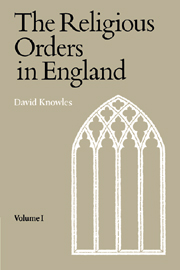Book contents
- Frontmatter
- Contents
- PREFACE
- LIST OF ABBREVIATIONS
- Part One The Old Orders, 1216—1340
- Part Two The Friars, 1216–1340
- Chap. XI The Friars Minor
- Chap. XII The coming of the Minors
- Chap. XIII The order of Preachers
- Chap. XIV The Preachers in England
- Chap. XV The evolution of the Franciscan ideal
- Chap. XVI The apostolic work of the Friars
- Chap. XVII Carmelites, Austin Hermits and lesser orders
- Chap. XVIII The early English Franciscan scholastics
- Chap. XIX Doctrinal and moral controversies: Kilwardby and Pecham
- Chap. XX The Friars from the Council of Lyons to William of Ockham (1272–1340)
- Part Three The Monasteries and their World
- Appendices
- Bibliography
- Index
Chap. XX - The Friars from the Council of Lyons to William of Ockham (1272–1340)
Published online by Cambridge University Press: 03 December 2009
- Frontmatter
- Contents
- PREFACE
- LIST OF ABBREVIATIONS
- Part One The Old Orders, 1216—1340
- Part Two The Friars, 1216–1340
- Chap. XI The Friars Minor
- Chap. XII The coming of the Minors
- Chap. XIII The order of Preachers
- Chap. XIV The Preachers in England
- Chap. XV The evolution of the Franciscan ideal
- Chap. XVI The apostolic work of the Friars
- Chap. XVII Carmelites, Austin Hermits and lesser orders
- Chap. XVIII The early English Franciscan scholastics
- Chap. XIX Doctrinal and moral controversies: Kilwardby and Pecham
- Chap. XX The Friars from the Council of Lyons to William of Ockham (1272–1340)
- Part Three The Monasteries and their World
- Appendices
- Bibliography
- Index
Summary
In the years immediately following the condemnation of Thomist theses by Tempier and Pecham disciples of the new school, which had been officially adopted by the chapter-general of the Preachers in 1278–9, multiplied at Oxford. If some of the older generation, such as the provincial, William of Hothum, and his successor, Thomas Jorz, were willing to temporize, while a number of the younger friars, for whom Richard Knapwell was spokesman, were importunate in their propaganda, a small body of masters came into prominence, at once convinced Thomists and thinkers of weight, who, while defending and expanding their system, did not hesitate to make additions or modifications of detail in the scheme of St Thomas. The most notable of these was unquestionably Thomas of Sutton, who taught at Oxford at the end of the century. Sutton had absorbed Thomist doctrine in its entirety, including the metaphysical basis, and himself composed a treatise on the unity of form in which he gave precision to controverted points. He also entered the lists with a direct attack on Scotus. He is one of the few English Thomists of the golden age of scholasticism, when the discipline was still a living force, drawing its strength from tradition and Scripture and passing from acquired conclusions to new developments without departing from the pure principles of the system.
Sutton was a theologian pur sang, and his best work was done by 1300.
- Type
- Chapter
- Information
- Religious Orders Vol 1 , pp. 233 - 252Publisher: Cambridge University PressPrint publication year: 1979



